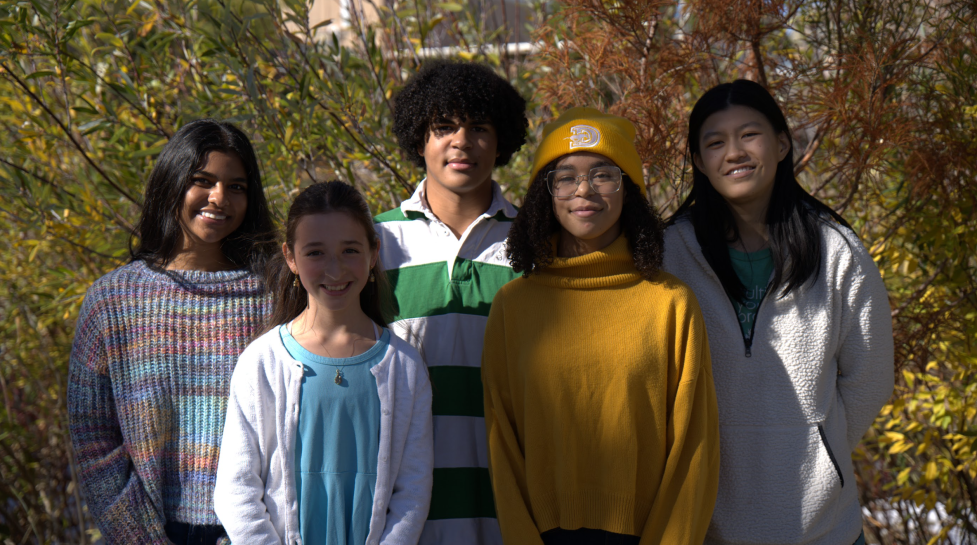For World Children's Day on Nov. 20, we asked Boulder youth: What does a child-friendly city mean to them?
What Would Make Boulder a More Child-Friendly City?
World Children's Day was started by UNICEF and is celebrated each year in November.
To celebrate this day, we partnered with Growing Up Boulder to ask Boulder youth: What does a child-friendly city mean to you?
Read on for their insightful answers - and ideas for how you can help make Boulder a place where children can thrive and answer the challenges of tomorrow.
Bella

- “To me, a child-friendly city is a place that has resources and is willing to support kids with these resources to let them reach their full potential.”
- "As a young person, you may have the ideas but having a place where you can put your ideas to use is important."
- “I wish adults knew that a lot of kids want to plan for their future and figure out what they want, but not a lot of kids know how to do that.”
- “I want adults to know that kids are experiencing the same world, but we have fresh ideas.”
- “We as kids may have amazing ideas but if we don’t have the resources we can’t bring those idea forward.”
- “To make my city more child-friendly, I’d like to see easier ways to get around.”
- “To make my city more child-friendly, I’d like to have better access to and more communication for child- and teen-friendly spaces in Boulder."
- “To make my city more child-friendly, I’d like to see more personalized social services - one size does not fit all and every person is different."
Sean

- “To me a child-friendly city means that our voices are elevated allowing us to shape not only our future, but the future of everyone that comes after us.”
- “Giving a voice to other people.”
- “Making sure other people are able to express their voice."
Liliana

- "Youth voices matter because kids are the future.”
- “All kids want the world a certain way and if kids can start doing that now - building up the world to where we want it to be - then it’ll be much easier when we are adults.”
- “I want adults to know what a kid’s perspective is; the next generation is going to have the world for a long time and you have made your mark, but it’s now time for kids to make their mark. Kids will be around longer and they might as well start now.”
- “I want to fix and help climate change, so that the next generation after us can see nature and the world like we see it today or hopefully, better than today.”
- “To make my city more child-friendly, I’d like to see a place where if you're not sure where to go, you have somewhere to safe and fun to be."
- “To make my city more child-friendly, I’d like to see more places where children-friendly hang out spots where young people can go between school and home.”
- “To make my city more child-friendly, I’d like to see more child- and youth- friendly spaces where parents know their kids can go and be safe and have fun.”
Ting

- “To me, a child-friendly city means a city that cultivates youth voice and prioritizes their future above others.”
- “I want adults to know that although they themselves were children once, times have changed. With every generation, perspective changes.”
- “We are often overlooked when we can often be the best asset.”
- “To make my city more child-friendly, I’d like to see safer transportation options for instance walking paths with more light.”
- “To make my city more child-friendly, I’d like to see schools teach more coping strategies for different challenges we face like safety and mental health; these are things every person should know and have access to."
Nandini

- “Youth voices matter, because there are some youth around here that can’t speak up for themselves, so those who can should take advantage of that and speak up for the broader community.”
- “A child-friendly city means to me: a place where my future and my peers’ future is protected, safe, and matters."
- “I want adults to know that kids notice the problems and issues in our world too. People think we are oblivious, but that's not true. We notice them and we are worried about our future, especially climate change. But because kids notice, we also have really creative ideas about how to fix them.”
- “We speak a lot about the future and I want to make sure there is a world out there for us and for our children when we are ready.”
- “To make my city more child-friendly, I’d like to more walkable safe spaces - where I can walk and feel comfortable traveling."
